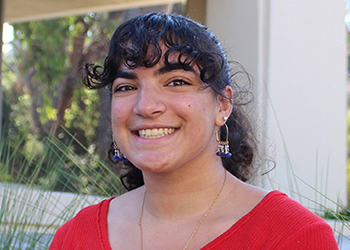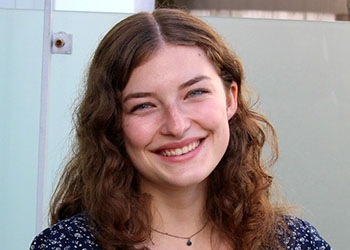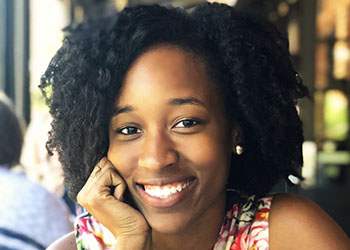Meet some of our cognitive science majors.
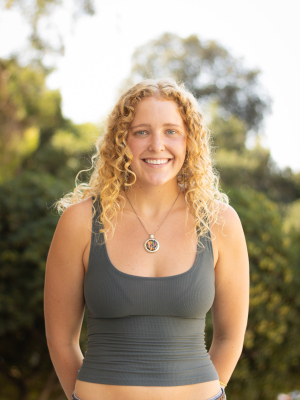
Amanda George ’26
Hometown: Madison, WI
Major: cognitive science; minors: CTSJ, Public Health
What was your motivation to major in cognitive science?
I came to college expecting to pursue psychology, but once I began studying the brain more deeply, I realized that was where my true fascination lay. I wanted to understand what really happens in our brains to shape experiences like music, art, addiction, love, and more.
Who were some professors that had a lasting impact on you, and why?
Prof. Urstadt has been an incredible mentor: my advisor, professor, and research guide. His compassion, organization, and passion for his work has left a lasting impact on me. Prof. Nelli and Prof. Sabo also hold a special place in my academic journey; as my Intro to Cognitive Science instructors, they opened my eyes to the possibilities within this field and have continued to support and challenge me in meaningful ways. All of the cognitive science professors bring that same energy, making this major so special: a true community of faculty who love what they do and care about us as individuals.
[Cognitive science] has allowed me to understand myself on a much deeper level than when I arrived at college while also connecting me to a community of thoughtful, supportive, and inspiring peers. Being immersed in this environment and consistently engaging with cutting-edge findings has pushed me to clarify my own path forward.
Have you participated in directed research, study abroad, InternLA, SRP, URC, etc. and how have those experiences impacted your time here at Oxy?
I’ve conducted research with Prof. Urstadt on neural rewiring and drug addiction in rat brains. This experience has been life-changing, shaping my post-grad goals and who I am as a person. Through this research and the SRP program, I have realized this is what I want to continue pursuing. SRP also really opened my eyes to how research works, the positives, the challenges, and everything in between. I gained a clearer understanding of the persistence and creativity it takes to move a project forward, and I learned how collaboration and mentorship are essential parts of the process.
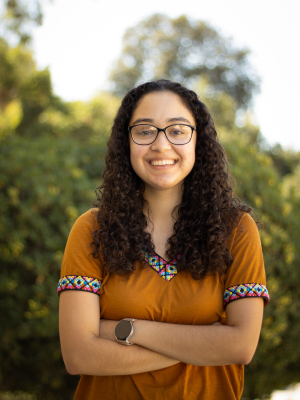
Jacqueline Pichardo ’26
Hometown: San Diego, CA
Major: cognitive science, Group Language (Spanish & Linguistics)
What was your motivation to major in cognitive science?
My interests have always been language, particularly bi/multilingualism and the brain. So what initially drew me to the cog sci major was how interdisciplinary it is, allowing me to explore both of my interests. I still remember first learning about aphasias in Introduction to Cognitive Science and simply wanting to learn more! In the last few years I have been able to do exactly that through both a cognitive and linguistic perspective.
Who were some professors that had a lasting impact on you, and why?
Ever since taking COGS 101 my first year with Prof. Nelli and Prof. Sabo, I have continued to take classes with both of them and they are now my mentors: Prof. Nelli is my academic advisor and Prof. Sabo is my senior comps advisor. As a Group Language double major, I have also had the opportunity to take linguistics courses within the cog sci department with Prof. Gu and in the Spanish and French Studies department with Prof. Bolyanatz. Overall, I have loved seeing the Cog Sci department grow and have really enjoyed working with different professors—whether it be in a class setting or in research opportunities—who have supported me and encouraged me to explore and combine my many interests!
Another primary goal as a Latina in a STEM field is to not only advocate for diversity and inclusion in STEM research and curriculum, but to continue to encourage young Latinas to pursue careers in STEM while increasing overall Latinx representation.
Have you participated in directed research, study abroad, InternLA, SRP, URC, etc. and how have those experiences impacted your time here at Oxy?
During my time at Oxy, I have been fortunate enough to receive scholarships, gain research experience, study abroad, and apply what I have learned from both of my majors as an ESL instructor. The Creating Opportunities in Science and Mathematics for Occidental Students (COSMOS) program funded by the NSF has further connected me with my peers and professors in addition to funding research as well as research conferences. Regarding my research experience, I have participated both in directed research during the academic year with Prof. Sherman on an acoustic project related to both perception and phonetics as well as part of the URC SRP with Prof. Bolyanatz in a project where we extended previous research, primarily in English, on the perception of creaky voice to Spanish! I also had the opportunity to study abroad in Salamanca, Spain, where I took psychology classes in Spanish. One of my favorite courses I took was a neuropsychology class that was taught with a focus primarily on speech therapy. Finally, I am a Coordinator for Comparte, an on-campus organization that teaches English to Spanish-speaking Oxy staff, where I am able to apply not only my own experiences but what I have learned in both cog sci and linguistic classes about learning a second language! As a Latina first-generation college student, I am incredibly grateful for the support and mentorship that have guided me in all of these amazing experiences at Oxy!
How has the Cog Sci department impacted your long-term goals?
The interdisciplinarity of the major has encouraged me to explore my interests in neuroscience, linguistics, and even psychology. I am currently looking at graduate schools with speech language pathology programs; I am particularly interested in stroke patients or adults with aphasias and would like to further explore the role of bi/multilingualism in speech therapy.
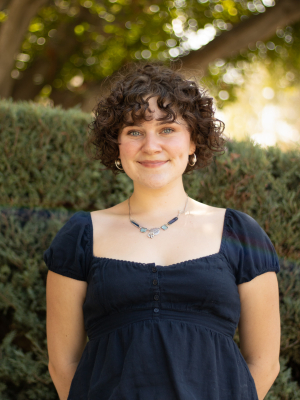
Melissa Dodson ’26
Hometown: Dallas, TX
Major: cognitive science, computer science
What was your motivation to major in cognitive science?
I have always been very interested in understanding the human mind. What drew me to the cognitive science major was the interdisciplinary curriculum, which allows me to study the mind from various perspectives of interest, including philosophy, neuroscience, and computation, creating a unique and holistic view of cognition.
Who were some professors that had a lasting impact on you, and why?
I have had the privilege of learning from many outstanding faculty members in the department, notably Prof. Sherman, Prof. Levitan, and Prof. Urstadt. Prof. Sherman gave me the opportunity to work in her lab freshman year on a project studying the relationship between artistic skills and cognition. This provided me with an invaluable opportunity to begin conducting research early in my undergraduate career and introduced me to my love for research. I am currently working with Prof. Urstadt in the NeuroSlice Lab, and it has been an incredibly rewarding experience to engage with neuroscience research methodologies such as immunohistochemistry. The mentorship of the Cognitive Science faculty has been instrumental in my growth as a student and researcher, and their passion continues to inspire me.
The Cognitive Science department has allowed me to explore diverse approaches to studying human cognition, including psychological tests, immunohistochemistry, and computational modeling. Just as impactful as the academics has been the department’s vibrant and supportive community. The passion of both the students and faculty has continually inspired me.
Have you participated in directed research, study abroad, InternLA, SRP, URC, etc. and how have those experiences impacted your time here at Oxy?
Since my first year, I have participated in directed research, working with different professors to gain hands-on experience with a variety of methodologies. During the fall of my junior year, I got the opportunity to study abroad in Vienna as part of the Psychology and Social Sciences program through IES. Through studying the psychology discipline within cognitive science, I acquired a more holistic view of how our brain works and its influence on behavior. I participated in SRP this past summer, and I really enjoyed the opportunity to design and carry out my own project.
How has the Cog Sci department impacted your long-term goals?
After graduation, I intend to pursue a doctorate in psychology, building on the solid foundation of research and mentorship I have received within the cognitive science department.
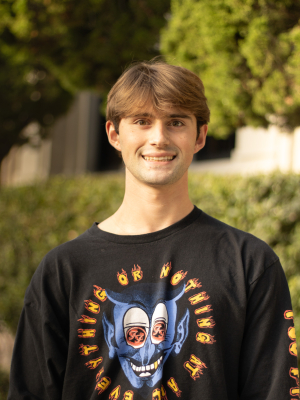
Matthew McMahon ’27
Hometown: San Francisco, CA
Major: cognitive science; minors: biology, neuroscience
What was your motivation to major in cognitive science?
I have always been fascinated by the brain and the mind, and after my first year, I knew I wanted to study the brain in some fashion. At Oxy, there are generally a couple different pathways that one can take if they want to study the brain: biology, psychology, or cognitive science. I chose cognitive science because of its interdisciplinary nature and how fascinating every class was. Every class has a unique approach to looking at cognition.
Who were some professors that had a lasting impact on you, and why?
Prof. Urstadt and Prof. Levitan have both sparked and facilitated my fascination for cognitive science and neuroscience. I’ve participated in two semesters of research with Prof. Levitan, who has been a fantastic mentor and has guided me through the research process. In her lab, I’ve worked on two replication/extension projects, the current one being centered around empathy and its cognitive costs. Prof. Urstadt has taught some of my most engaging classes here at Oxy, and his classes ultimately inspired me to minor in neuroscience.
InternLA is a wonderful program that allows undergraduates to get real world experience in various disciplines while also learning various career skills through the Career Labs. Through InternLA, I was exposed to the biotech industry and molecular biology research, which have since emerged as career paths that genuinely align with my own interests.
Have you participated in directed research, study abroad, InternLA, SRP, URC, etc. and how have those experiences impacted your time here at Oxy?
I’ve participated in direct research with Prof. Levitan and I’ve done InternLA. As part of InternLA, I worked at the Pasadena Bio Collaborative, which is a biotech collaborative lab that holds over 15 startup companies. Although I had never worked in a Wetlab (other than Oxy’s lab courses), I was able to learn and eventually mentor students on various biotech projects through the help of my peers and my advisors.
How has the Cog Sci department impacted your long-term goals?
The cog sci department at Oxy is full of the most passionate, sincere, and helpful professors. Each professor brings their own unique teaching style and interests, and they care about every one of their students' goals and interests. Although I am not set on my career aspirations, I am interested in studying neuroscience at the graduate level, and my advisor has been tremendously helpful in helping me navigate this process in terms of my courseload and relevant skills.

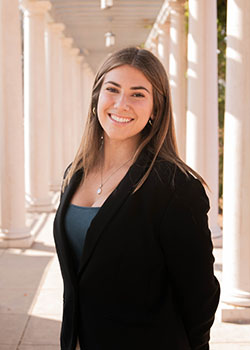
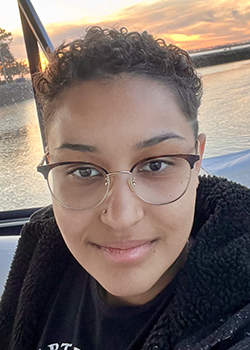
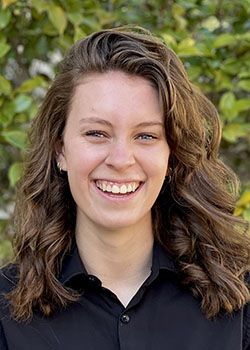
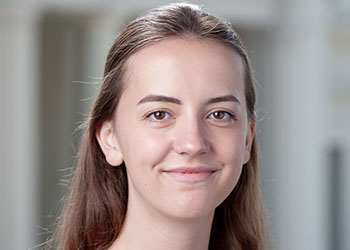 Isabel Geddes ’20
Isabel Geddes ’20